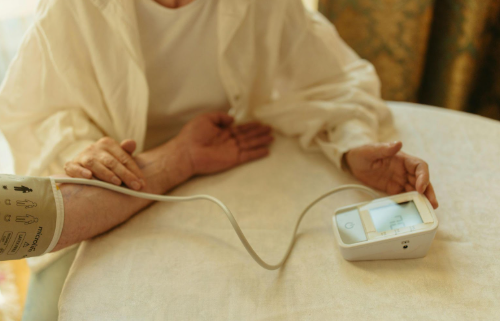Managing Seasonal Allergies at Home: How Home Health Services Can Help

Every year, as the seasons change, millions of people experience sneezing, watery eyes, congestion, and fatigue. These symptoms are often caused by seasonal allergies. For many, the discomfort disrupts daily life and affects both work and sleep. Managing these allergies at home is possible, and with proper care, relief can be more consistent and long-lasting.
Here’s how home health services support individuals struggling with seasonal allergies. It will also provide insight into practical steps that can reduce allergy symptoms in a home setting.
What Are Seasonal Allergies?
Seasonal allergies happen when the immune system reacts to allergens such as pollen, dust mites, or mold spores. These allergens are more common during certain times of the year, especially spring and fall. The body treats these particles as threats, which leads to common allergy symptoms like sneezing, nasal congestion, an itchy throat, and red eyes.
In some cases, allergies can trigger asthma symptoms or lead to sinus infections. For people with existing respiratory issues or weak immune systems, these allergies can become more serious. That is why managing these symptoms at home is not just about comfort but also about health and safety.
Keeping the Indoor Environment Clean
One of the most important ways to reduce allergens at home is by keeping the environment clean. Regular cleaning can remove dust, pet dander, and mold, all of which can trigger allergic reactions.
Home health providers often help patients follow a regular cleaning routine. They can assist with vacuuming using HEPA-filter vacuums, wiping down surfaces, and reducing clutter that collects dust. They may also recommend washing bed linens in hot water every week and using allergy-proof covers on mattresses and pillows. These small steps make a big difference in reducing exposure to common indoor allergens.
Controlling Air Quality Indoors
Poor indoor air quality can make allergy symptoms worse, so air purifiers with HEPA filters can be used to remove pollen, dust, and pet dander from the air. Keeping windows closed during high pollen days and using air conditioning instead of opening windows can also help.
Home health professionals can help monitor air quality inside the home. They might suggest ways to reduce humidity, which can slow down the growth of mold. Simple changes such as fixing leaks, using dehumidifiers, and maintaining ventilation systems can support better air quality.
Tracking Symptoms and Medication
Seasonal allergies are often treated with antihistamines, nasal sprays, or decongestants. However, not everyone responds the same way to these medications. Some people may need help remembering when to take their medicine or keeping track of side effects.
Home health services can support this process. Trained professionals can help patients manage their prescriptions, track their symptoms, and monitor their progress. They can also communicate with doctors to adjust treatments when needed. This support is especially helpful for older adults or those with multiple health conditions.
Offering Personalized Allergy Education
Many people are not fully aware of what triggers their allergies. A home health nurse or caregiver can educate patients about avoiding specific allergens. This might include checking daily pollen forecasts, keeping pets out of bedrooms, or removing rugs that trap dust.
By helping individuals recognize patterns in their symptoms, home health providers can guide them to make informed choices. This ongoing education helps patients feel more in control of their condition and prevents future flare-ups.
Supporting Children and Older Adults
Children and older adults are often more vulnerable to allergy symptoms. Young children may not be able to explain how they feel, and older adults may confuse allergy symptoms with other health conditions.
These professionals are trained to recognize signs of allergies in these groups. They can work closely with family members to create a safe and supportive home environment. Whether it’s helping a child avoid certain outdoor activities during high pollen times or adjusting an elderly patient’s room to remove allergy triggers, these services provide relief and confidence to families.
Reducing Emergency Room Visits
When seasonal allergies are not managed properly, they can lead to more serious health problems, including asthma attacks and sinus infections. This may result in hospital visits, which can be stressful and costly.
Home health care helps prevent such situations by offering regular monitoring and early intervention. If symptoms worsen, a nurse or caregiver can notice the changes and recommend medical attention before it becomes an emergency. This type of care keeps people safer at home and reduces the risk of complications.
Promoting Long-Term Allergy Management
Seasonal allergies often come back each year. Without proper planning, symptoms can keep returning and affect quality of life. Home health services play a key role in long-term allergy control.
They help patients build daily habits that reduce exposure and improve health. Over time, these routines become part of a lifestyle that supports better breathing and fewer symptoms. By working with patients over several months or years, home health providers help reduce the impact of allergy season after season.
Improving Comfort and Daily Function
Living with allergies can affect sleep, focus, and mood. For some, even simple tasks become difficult when symptoms are strong. Home health care supports people in their daily routines, helping them stay active and comfortable.
Whether it's preparing meals, offering reminders for medication, or providing encouragement during flare-ups, this type of care helps patients stay on track. It also reduces stress by giving them someone to rely on during allergy season.
Final Thoughts
Seasonal allergies can be difficult to deal with, but they don't have to take over your life. From cleaning and air quality control to medication support and personal education, home health care offers complete support right where it's needed most—at home.
Don’t let allergy symptoms disrupt your comfort or well-being. At
Five Star Home Health Care Agency, we provide professional, in-home care tailored to your health needs. From symptom monitoring to personalized allergy management, our team is here to help you breathe easier, right in the comfort of your home.
Schedule a consultation today!










